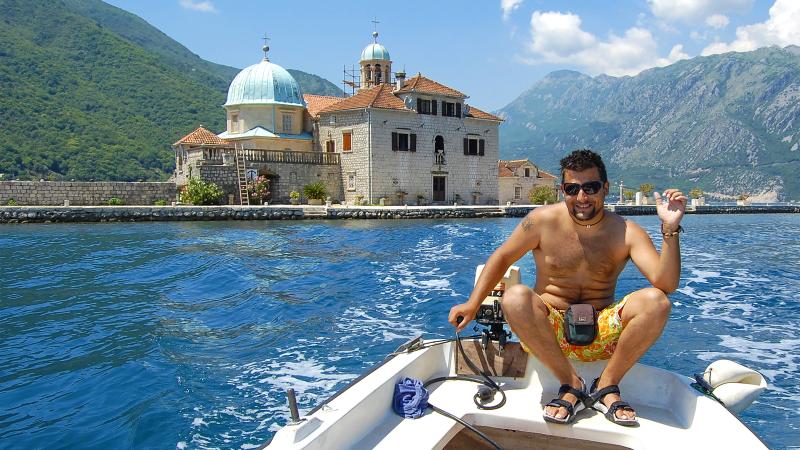Rick Steves’ Europe: The high life and humble devotion on Montenegro’s Bay of Kotor
Appears in the Online Edition, April 2022.
Leaving Mostar, in Bosnia and Herzegovina, I drive south to yet another nation that emerged newly independent from the ashes of Yugoslavia: Montenegro. During my travels through this region, my punch-drunk passport has been stamped, stamped, and stamped again. While the unification of Europe has made most border crossings feel archaic, here the breakup of Yugoslavia has kept them in vogue. Every time the country splintered, another border was drawn. The poorer the country, it seems, the more ornate the border formalities. By European standards, Montenegro is about as poor as it gets. They don’t even have their own currency. With just 600,000 people, they decided, “Heck, let’s just use euros.”
For me, Montenegro, whose name means “Black Mountain,” has always evoked the fratricidal chaos of a bygone age. I think of a time when fathers in the Balkans taught their sons that “your neighbor’s neighbor is your friend” in anticipation of future sectarian struggles. Back then, for generation after generation, So-and-so-ovich was pounding on So-and-so-ovich, so a secure mountain stronghold like this was worth all of that misery.
A recent visit showed me that this image is now dated. The country is on an upward trajectory. Many expect to see Montenegro emerge as a sunny new hotspot on the Adriatic coastline. International investors (mostly from Russia and Saudi Arabia) are pouring money into what they hope will become their very own Riviera.
Unfortunately, when rich people paste a glitzy facade onto the crumbling infrastructure of a poor country that isn’t ready for it, you get a lot of pizzazz with no substance. I stayed at a supposedly “designer” hotel that was a comedy of horrible design. I felt like I was their first guest ever.
A huge thunderstorm hit with enough fury to keep the automatic glass doors opening and closing on their own. Nothing drained — a torrent cascaded down the stairs and through the front door. The rain also brought a backed-up sewage smell that drove me out of my room.
Eventually the rain stopped, the clouds parted, and I went out to explore. My first stop was the Bay of Kotor, where the Adriatic cuts into steep mountains like a Norwegian fjord. At the humble waterfront town of Perast, young guys in swim trunks edged their boats near the dock, jockeying to motor tourists out to the island in the middle of the bay. According to legend, fishermen saw the Virgin Mary in the reef and began a ritual of dropping a stone on the spot each time they sailed by. Eventually the island we see today was created, and upon that island the people built a fine little church.
I hired a guy with a dinghy to ferry me out to the island, where I was met by a young woman who gave me a tour of the church. In the sacristy hung a piece of embroidery — a 20-year-long labor of love made by a local parishioner 200 years ago. It was exquisite, lovingly made with the finest materials available: silk and the woman’s own hair. I could trace her laborious progress through the line of cherubs that ornamented the border. As the years went by, the hair of the angels (like the hair of the devout artist) turned from dark brown to white. Humble and anonymous as she was, she had faith that her work was worthwhile — and two centuries later, it’s appreciated by a steady parade of travelers from distant lands.
I’ve been at my work for more than three decades now and my hair is also getting a little gray. I have a faith that it — my work, if not my hair — will be appreciated after I’m gone. That’s perhaps less humble than the woman was, but her work reminds me that we can live on through our deeds. Her devotion to her creation (as well as to her creator) is an inspiration to do both good and lasting work. While traveling, I’m often struck by how people give meaning to their lives by contributing what they can.
I didn’t take a photograph of the embroidery that day. For some reason, I didn’t even take notes. At the time, I didn’t realize I was experiencing the highlight of my trip. The impression of the woman’s tenderly created embroidery needed time to breathe — like a good red wine. That was a lesson for me. I was already moving on to the next stop. When the power of the impression did open up in my mind, it was rich and full-bodied – but I was long gone.
If travel is going to have the impact on you that it should, you have to climb into those little dinghies to discover those experiences. The best encounters won’t come to you. And you have to let them breathe.
(Rick Steves (www.ricksteves.com) writes European guidebooks, hosts travel shows on public TV and radio, and organizes European tours. This article was adapted from his new book, For the Love of Europe. You can email Rick at [email protected] and follow his blog on Facebook.)

